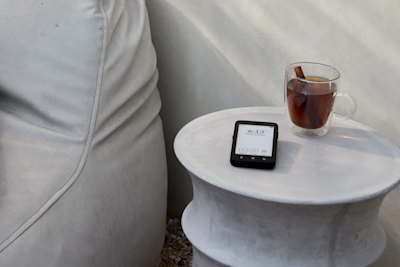How to Sleep Better
We'd like to help you improve the quality of your sleep.
Good sleep depends on something called sleep hygiene. Finding the right habits to suit your lifestyle will help you fall asleep quickly and wake up with more energy.
Do you use your mobile phone before going to sleep? Is aimlessly scrolling through Twitter, Instagram or Facebook posts part of your late night routine? If the answer to either of these questions is yes, then you should probably stop. We know it’s easier said than done but looking at a device which emits a lot of blue light before you go to sleep is undoubtedly not healthy.
Turning the brightness down or switching your phone to a black and white mode can help, as well as using an app like F.lux but it won’t necessarily improve your sleep. Exposure to blue light causes reactions in the brain that disturb our circadian rhythm. It may reduce the secretion of melatonin, which sends a signal to the brain that it’s still daytime. The best solution is to simply give up using electronics with LCD screens for at least two hours before bedtime. If it’s your favorite time to read, try to use an e-book reader with an E Ink display or go old school, read a physical paper based book! For an even more restful sleep environment, consider using a minimalist alarm clock like Mudita Harmony instead of relying on a smartphone. Designed specifically to avoid unnecessary disruptions and blue light, Mudita Harmony helps create a tech-free bedtime routine, promoting a more restorative night’s sleep.
Mudita Harmony is your sleep companion which helps you establish healthy bedtime habits, improve the quality of your sleep, as well as bring you a sense of calm.
Why is sleep so important and how much sleep is enough?
Sleep is a major part of our lives. It supports our body, it enables us to continue functioning. It affects our emotional balance, creativity, concentration, immune system and much more!
Of course, this varies from person to person but if you’re an adult it’s recommended you sleep between 7 to 9 hours per night . Children and teenagers need around 9–10 hours of sleep. If you feel awake and energetic during the day it’s a sign that you’ve had enough sleep. Fatigue, moodiness, depression, difficulties in dealing with stress and emotions or premature skin ageing are some of the symptoms of sleep deprivation.
Quality over quantity
The length of sleep you get in hours isn’t the only thing that matters. The quality of your sleep at different phases makes a huge difference to how you’ll feel in the morning. The most important phase is deep or REM (Rapid Eye Movement) sleep. During this phase, our body regenerates and regains energy.
What can you do to get a deeper sleep during the night? The best ideas usually involve giving up alcohol, quitting smoking and staying away from any noise or light pollution during the night. It’s also advisable to sleep an extra 30 minutes in the morning as it should make your REM sleep phase last longer. Sticking to a regular sleep schedule, regular exercise, avoiding caffeine and food containing sugar as well as keeping your bedroom dark will help too.
Don’t forget to prepare your bed
If you want to sleep soundly and efficiently, a properly selected mattress is essential. While selecting the mattress, you should take into account the individual characteristics of the person that will sleep on it, especially his/her weight and any potential health problems. It’s important to remember that the mattress should be neither too soft nor too hard. It should also accommodate the body pressure while maintaining the spine in an optimal position. This will prevent unnecessary muscle and spine soreness and significantly increase the comfort of sleep overall.
You might also consider buying an orthopedic pillow that will support the cervical spine and neck muscles. It’s a great solution, especially for those who suffer from whiplash pain, numbness etc. as well as for those who have trouble getting to sleep.
Pranayama — another way to fall asleep quickly
The yoga technique Pranayama is very simple and doesn’t require any skills or preparation. You just have to lie on the right side of your body and close your right nostril with a finger. Take long, calm breaths through the left nostril. Remember to alternate your nostril breathing. This exercise allows you to oxygenate the left hemisphere of the brain, which in turn makes you calm, relaxed and makes falling asleep a lot easier.
You can also try another kind of mediation, Yoga Nidra. Its purpose is to enter a state of deep relaxation. If you have trouble sleeping, you should practise it before going to bed.
Watch this video if you’d like to try it out:
Incorporating relaxation techniques like Pranayama and Yoga Nidra can significantly improve your bedtime routine. Mudita Harmony E Ink alarm clock complements these practices with unique features like a meditation timer and a relaxation library. This helps foster a calming environment, supporting healthy sleep habits and avoiding smartphone disruptions.
Mudita Harmony defines Healthy Sleep Hygiene
Good luck and sleep tight!
What methods do you use to get to sleep? Have you tried any of the methods we’ve mentioned? Please feel free to leave a comment below, send us an email via hello@mudita.com or get in touch via social media (send us some photos or videos too), you can find us on Facebook, Twitter and Instagram, let’s connect! To learn more about Mudita, take a look at our website and our other posts.
If you enjoyed reading this article, please share and recommend it!
Related stories

The Great Disconnect & How Technology is Changing Relationships
Technology keeps us reachable 24/7, but often emotionally unavailable. Discover how digital habits affect relationships and how to reconnect offline.

Why Kompakt is a Different Kind of Upgrade for the New Year
A different kind of upgrade for the new year. Discover how Mudita Kompakt, a minimalist phone, helps reduce digital overload & restore focus, balance & clarity.

Why the World Needs a Mindful Field Watch
Why the world needs a mindful field watch. Discover how Mudita Radiant offers clarity, durability, and a calmer relationship with time.
If you'd like to receive the best stories from our blog, keep up to date with our progress and get notified about our product releases and special discounts.